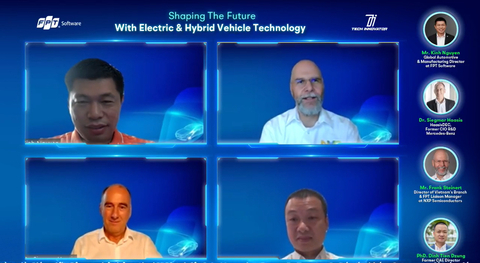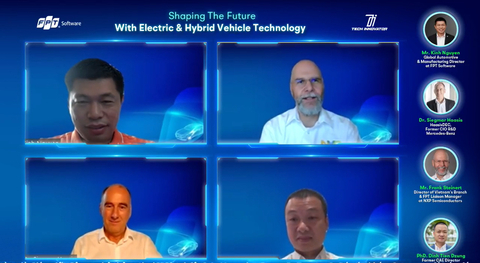HANOI, Vietnam--(BUSINESS WIRE)--Dr. Haassis DEC, Former CIO R&D Mercedes-Benz, Mr. Frank Steinert, NXP Semiconductor, and other automotive technology specialists from FPT Software, Kinh Nguyen and Dzung Dinh, recently discussed the future of hybrid and electric car technologies. Global experts believe that future cars will not only be electric and self-driving but will also interact with one another to avoid accidents and congestions. The transition to electric vehicles (EVs) necessitates an increase in demand for software engineers.
Global EV sales in the last 10 years have grown 100 times, from 55.4 thousand (2011) to 6.8 million (2021), according to a International Energy Agency report. The introduction of Tesla's Model 3 in July 2017 contributed significantly to this trend.
Meanwhile, global regulations on carbon emissions reduction accelerated the transition from Internal Combustion Engines (ICE) to EVs. Last year, the European Union proposed an effective ban on ICE from 2035, hastening the switch to EVs.
It is most likely the end for ICE will happen soon. UBS, a global financial services consultant, predicts that 20% of all new cars sold globally will be electric by 2025 and increase to approximately 50% by 2030. Some experts predict 100% of all new cars will be electric by 2040.
All across the globe, “the transition is already happening” Mr. Dzung Dinh said. “Nowadays, we see lots of EVs on the road, Tesla, Ford in the US. GM, Audi, Mercedes in the EU. In Vietnam we already have VF e34 on the road, and more product lines will soon be introduced.”
Along with the predicted dominance of EVs, is the growing importance of software in the automotive industry. It is because the industry requires a wide range of exclusive softwares particularly for EV manufacturers, such as monitoring, navigation and maintenance softwares. As the EV market continues to grow, software needs are also likely to evolve.
Commenting on this, Dr. Siegmar Haasis, the Founder and CEO of Haasis Digital Engineering Consulting and a former CIO R&D of Mercedes-Benz, stated “In the last 20, 30 years, the industry has been dominated by the hardware and the software is just the consequence. Now it has changed from a 90-10 ratio to a so-called 50-50. Everyone wants to become a software-defined and software-related company.”
Additionally, software alters how cars are manufactured, Digital Twins technology is an example. Digital Twins is a digital representation of a car from various angles that encompasses all its capabilities. Many automakers are applying Digital Twins to replace how they traditionally validate monitor physical assets. “With digital validation [using Digital Twins], the product creation process can be shortened from 3-5 years to just around 12 months. And it can save up to 30% of the hardware prototype cost” - Dr. Siegmar Haasis emphasized. However, as Frank added, “there will be plenty of digital twins for each of the models for the entire lifetime.”
As a result, there is a growing demand for software engineers across various departments in automobiles. From the employers’ perspective, Mr. Kinh Nguyen, Senior Vice President & Global Automotive & Manufacturing Director at FPT Software commented that even then, employers likely “won’t find them in the US, in the EU or Asia.” He proved it by showing several articles calling for 5000 even 10,000 new software engineers.
To bridge the critical situation, last July, FPT Software organized the Automotive Tech Show 2022, connecting more than 1,000 engineers and technology students with passion for vehicles with leading employers. The company promises to promote the development of high-quality human resources for the automotive technology industry.
FPT Software is the first Vietnamese enterprise and is one of the 21 development partners of AUTOSAR, the standardized architecture created by top automotive service providers and corporations.




